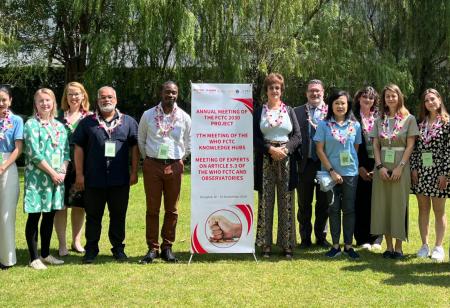
Blogpost: The Importance of Your Participation in Surveys for Curbing the Tobacco Epidemic - 15 October 2017

Every year 7 million people die prematurely from tobacco smoke globally, 13% of which are non-smokers exposed to tobacco smoke (WHO). The constraints on developing countries’ resources are often most transparent in the health sector, where increased demand heightens health expenditures, increases the cases of premature mortality and preventable morbidity. This creates a need for answers on how to address these problems.
Good data are the foundation of sound research. Research on human behaviour provides a battery of answers to society’s everyday health and social problems, among others. Human behaviour can be analysed by gathering data from populations through surveys.
Participating in surveys is completely voluntary. However, it is important that individuals are aware that participating in surveys, among other research designs, provides an opportunity for respondents to voice their concerns, experiences and express their opinions while simultaneously contributing to the underlying answers to our everyday problems.
Sample surveys aim to capture a representation of the population. Higher response rates in these surveys raise the probability that the samples will be representative of the population. Participating in these surveys provides valid, reliable and comparable information. This information can be used by policy-makers to assess the barriers to effective policy implementation, monitor and evaluate how policies are meeting the intended goals and assess if additional investment is necessary to meet the policy objectives.
Questions on cigarettes or alcohol expenditure, quantities consumed per time period, age when one first smoked or consumed alcohol, etc. are all crucial for research on alcohol and tobacco control, both of which have substantial externalities on societies, communities, general populations and governments.
It is through survey data, which feeds into research, that we understand how tobacco or alcohol excise taxes, curb cigarette or alcohol consumption in households. Survey results also explain how tobacco or alcohol excise taxes affect smoking or drinking initiation and cessation rates, or how smoke-free policies affect businesses, the health costs of smoking, alcohol misuse, etc.
Our 15-30 minutes spent participating in a survey, provides crucial information that is necessary to address the various social problems we face. Take for instance the case of cigarette consumption. Today, it is largely known that inhaling second-hand smoke is deadly, because we have access to extensive evidence-based research on this topic. We have access to research that proves that smoking a pack of cigarettes daily for a full year equates to depositing one cup of tar into your lungs in that year (Tobacco Use).
These facts are made possible through research aimed at analysing human behaviour. This research relies on good data which in turn relies on higher response rates in surveys. Every response in a survey is a crucial building block to unlocking the answers to our everyday questions on the health and social problems we face.





